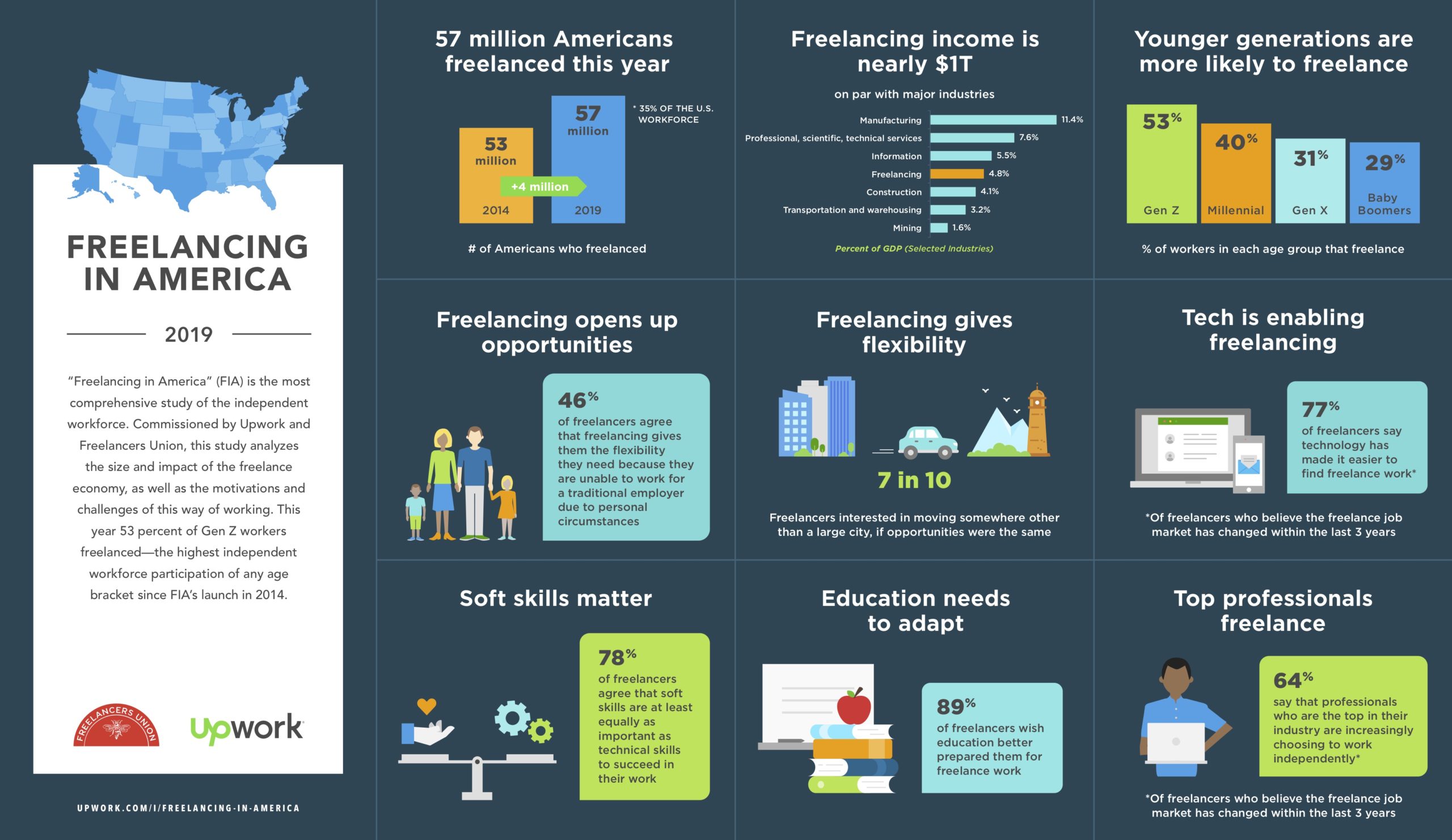
When I moved to Nashville in 2014, I noticed something.
I didn’t realize how critical of a trend it was going to become, the extent that it was going to impact everyday life, the rapid rate at which it was growing, or how it was going to become the new normal, but it seemed like everyone had a side hustle or a gig.
Okay, maybe not everyone, but close to half of the people I met.
And for the majority of them, these gigs weren’t their main source of income—a lot of them were hustling, contracting, and moonlighting on the side to earn some extra cash, pay down debt, or save up for a vacation.
It was kind of like cauliflower, podcasting, and Amazon Prime—no matter where you went, it was hard to miss.
Heck, even I was a part of this trend with all the writing, podcasting, consulting, and speaking I was doing on the side.
At first, I thought this was an American thing, since I had just moved to the States, but after talking to friends in Canada, reflecting back on the time my wife and I lived in Korea, and doing some research, I quickly realized how much of a global trend this was becoming—and how rapidly it was growing.
Have you seen it? Do you know anyone with a side hustle? Or gigging?
Where they’re working multiple jobs? Where at least one of those jobs is them working for themselves?
- Perhaps they’re selling things on Facebook Marketplace?
- Doing a side job as a contractor?
- Driving for Uber or Lyft?
- Freelancing?
- Delivering food for Grubhub or Skip a Dish?
- Renting out their place on Airbnb?
- Or how about someone who has quit their full-time job, with guaranteed salary and benefits, to start their own thing?
It’s called the gig economy and it’s become the new normal.
In 2019, 35% of the American workforce was a part of the gig economy—up from five years prior. That means 57 million Americans were self-employed in a part-time or full-time capacity getting paid for their time, skills, possessions, or expertise.
To give you some perspective, that’s more people than the entire populations of Canada, Liberia, Greece, and Puerto Rico combined!
And what’s so surprising about it all is just how rapidly the gig economy has grown.
I mean, can you believe that 68% of all gig workers surveyed joined the gig economy in the last five years? You see similar trends in Canada, the United Kingdom, and Australia, where the growing gig economy continues to affect normal everyday work, life, and love.
Just check out this one infographic on what the gig economy looks like in America and some of the implications.

The gig economy has quickly become the new normal because of the way that it’s changing everyday life.
You don’t even need to be working in it for it to affect you. Just think about the last time you bought something off of Facebook Marketplace, rode in an Uber, ordered food using an app, slept at an Airbnb, or got your IKEA furniture assembled by a Tasker from TaskRabbit.
That was all possible thanks to the gig economy and someone else’s side hustle.
The same is true even without an app, because every time you get a haircut, hire a contractor, have your lawn mowed, or hire a babysitter, you are also funding the gig economy.
Now you might be thinking, what does the gig economy have to do with me as a Christian? Or as a pastor or leader in the church?
The quick answer is way more than you might realize. But here’s the longer answer, and I’ll address it two ways:
1) How the gig economy affects everyone in your church
2) How the gig economy affects church leaders
How The Gig Economy Affects Everyone In Your Church
While I was researching the implications of the gig economy on everyday life for my new book, You Are What You Do: And Six Other Lies about Work, Life, and Love, I noticed a loose thread.
Initially, I ignored it, thinking that it was probably nothing. But the longer I spent investigating how the gig economy affected everyday life, the more the loose thread seemed to stick out. It kept jeering and taunting me to pull it. So I did. And that’s when things began to unravel.
The glitz and glamor of the gig economy came undone the more I pulled. Stitch after stitch loosened and fell apart, until I was eventually left with a mangled heap of lies:
1) You are what you do
2) You are what you experience
3) You are who you know
4) You are what you know
5) You are what you own
6) You are who you raise
7) You are your past
The rise of the gig economy has made each of these seven lies so compelling because the gig economy promises us freedom and flexibility….it gives us the illusion of control.
- “You have unlimited earning potential,” says the gig economy, “so if you want to go on a trip, just gig for a few hours.”
- “Want that new outfit? Sell a few things.”
- “Want the latest phone? Hustle for it. After all, everyone has free time that they waste, so just use that time and earn some extra cash.”
- “Be productive! You’re in control, so make it happen—rise and grind and get it done.”
Underneath the allure of the freedom and flexibility that the gig economy promises, are these 7 lies that are trying to change the way that we approach work, life, and love
No wonder these lies have become the new way to view ourselves!
They are the means to an end, since believing in them, and living our lives according to them, is apparently the “promised” path to freedom and flexibility.
And here’s the reason it’s so easy to fall into the trap of believing these lies. It’s because they are half-truths! Not the kind that are outright harmful, evil, or unjust. They’re the kind of half-truths that mingle truth and falsehood with the subtle and deliberate intent to deceive.
And in our day and age of fake news where half-truths are everywhere, these ones don’t actually seem too bad—which is precisely why they are so deceptive.
So if that’s just a glimpse into how the gig economy affects everyone in your church—whether they’re Christian or not—how does the gig economy affect leaders in the church?
That’s the topic of next week’s post.
In the meantime, if you’re interested in unpacking and learning more about the way these seven lies have seeped into our culture and our everyday work, life, and love, be sure to pick up a copy of my new book, You Are What You Do: And Six Other Lies about Work, Life, and Love.
[…] you have no idea what I’m talking about, you can read last week’s article for context. But last week, I addressed seven ways the gig economy is affecting everyone in our […]